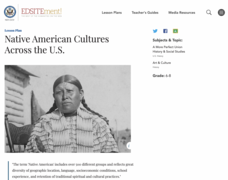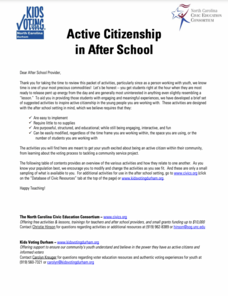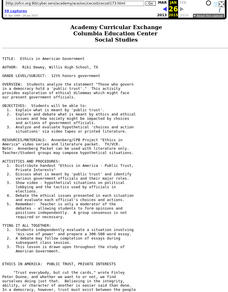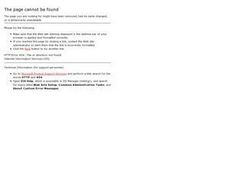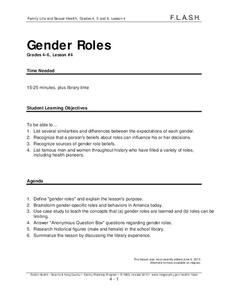Defining US
Integration of Education and American Society
How did the struggle for Civil Rights during the 1950s transform American society and politics? Why are American schools integrated today? Class members explore these essential questions by examining a series of primary and secondary...
National Endowment for the Humanities
Native American Cultures Across the U.S.
Learners examine how American Indians are represented in today's society. They read stories, analyze maps, and complete a chart and create an illustration about a specific tribe.
Stanford University
Carlisle Indian Industrial School
How do policies aimed to help actually hurt? Native American boarding schools—an attempt at assimilating children of indigenous tribes into white culture—had a shattering effect on those who attended. With primary sources, including...
Curated OER
Intolerance in American History
Examine the United States through the lens of intolerance using this 2-week unit plan, which includes details for 13 days of instruction. Scholars study examples of prejudiced behavior throughout history, discuss issues in groups,...
Curated OER
Native Americans: People of the Plains
A Venn Diagram invites learners to compare the roles of men and women in Native American societies. Learners write down as many ideas as they can, including roles that men and women shared
Curated OER
The American Flag and the Pledge of Allegiance
Students create a movie from the material they have learned during the unit covering the American Flag and the Pledge of Allegiance.
Carolina K-12
Active Citizenship in After School
Active citizenship is the bedrock of any great democracy. Continue the trend by teaching the next generation about voting rights and the functions of elections in society. The variety of activities in the resource includes a human...
American Psychological Association
How Psychology Benefits Society
How do people form their opinions about certain social issues? Scholars research current global issues to find out how psychology plays a role in swaying thoughts. Using blogs, writings, and presentations, they uncover why people think...
Curated OER
What Does It All Mean?
Students investigate the symbolism and meaning of samplers in American history. In this American history and sampler lesson, students examine pictures of original samplers and look at lists of the symbolism included in them. They connect...
Curated OER
The Art and Culture of the Afro-American
Your high schoolers will examine the community in which they live and discuss with the class. Using the Internet, they identify the importance of African-American art and how it relates to the African-American culture. Individually, they...
Curated OER
Ethics in American Government
Engage 12th graders in a series of activities focused on public trust and ethics in US Government. They view a series of videos, hold a class debate, and compose a short essay. Note: Suggested videos are listed but are not available...
Museum of Disability
Taking Down Syndrome to School
Teach your class about the ways they can befriend and understand people who are different from them with a reading comprehension instructional activity. As youngsters read Taking Down Syndrome to School by Jenna Glatzer,...
Humanities Texas
Primary Source Worksheet: Lyndon B. Johnson, Excerpt from “The Great Society”
Young historians examine Lyndon Johnson's vision for a rich, powerful, and upward society as detailed in this excerpt from his famous "Great Society" speech presented at the University of Michigan in 1964.
California Department of Education
Transitioning to High School
How do scholars prepare to take their next big step? The second in a series of six career and college readiness activities focuses on making a smooth transition from middle to high school. Groups research the resources available at their...
Stanford University
Napalm in Vietnam
An assessment requires high school scholars to use their knowledge of the Vietnam War while analyzing primary sources. A short answer format asks pupils to identify the image and explain the significance of using napalm during the...
Stanford University
Soviets in Berlin
High school historians use their knowledge of WWII to analyze a photo of the Soviets entering Berlin. The social studies assessment is comprised of two short answer questions to assess academics' understanding of the historical...
Gerald R. Ford Presidential Library & Museum
Benjamin Franklin: In Search of a Better World
Of the many roles he played, Benjamin Franklin most wanted to be remembered as B. Franklin, Printer. Learners of all ages find out more about this amazing man through the activities included in the Benjamin Franklin Tercentenary Guide....
Curated OER
What It Means to Be an American Indian
Students analyze primary source documents and evaluate historical evidence to find consequences of the policies that were adopted from the 1830s to today regarding Native American Indians.
Curated OER
Our “Civilized” Society
The Scarlet Letter is the anchor text in a four-week unit that examines Hawthorne's novel through the lens of the intolerances found in a supposed civilized society. In addition to their reading, class members watch clips from...
Center for History Education
Women's Rights in the American Century
Today, many young people find it hard to understand why it took over 150 years for women in the United States to get the right to vote—why there was even a need for the suffrage movement. As they read a series of primary source...
Curated OER
African American Life in the Nineteenth Century
Students read about the life and work of John and Mary Jones. Using primary source documents, they draw conclusions about their role in the abolistionist movement. They also examine artifacts from their lives and analyze their portrait...
iCivics
Tribal Government: High School
Did you know there are 567 federally recognized American Indian and Native Alaskan tribes and villages in the United States alone? The resource helps break down the complexities of many different tribal societies to explain the concept...
Seattle & King County Family-Planning Program
Gender Roles
Class members identify gender-specific roles and expectations in American society today by surveying adults, examining modern entertainment, and researching historical figures.
American Chemical Society
Can Gases Dissolve in Water?
Why does soda fizz when opened? Learners discuss the appearance of bubbles in soda bottles when opened. In groups, they design and complete an experiment comparing the amount of carbon dioxide dissolving in cold versus hot liquids.



